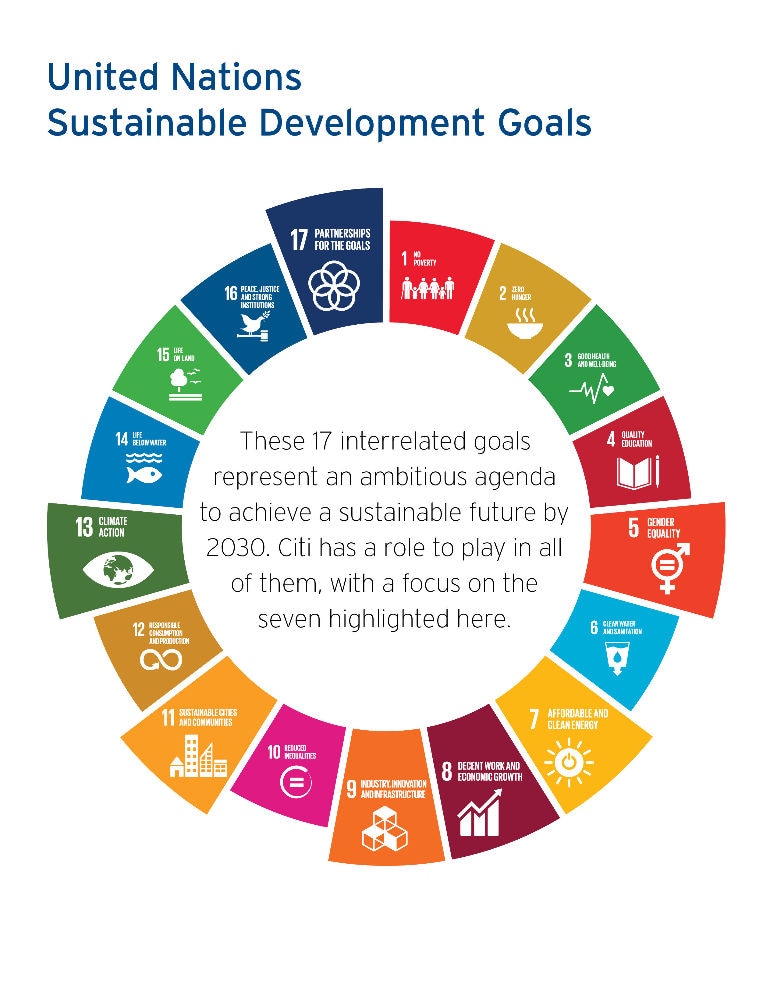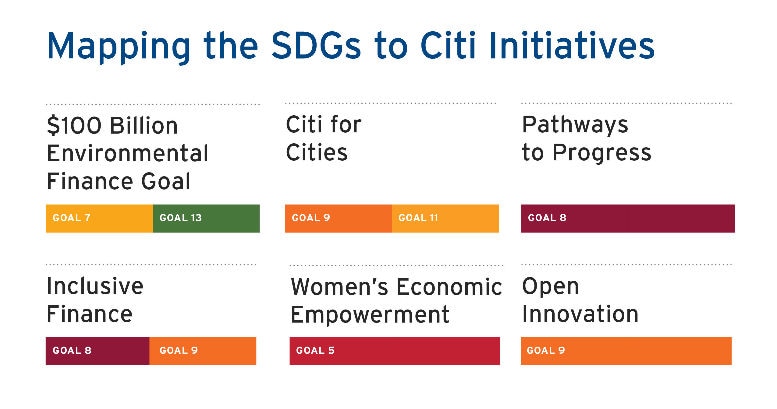Banking on 2030: Citi & the Sustainable Development Goals

Just in time for the United Nations General Assembly this week, we are pleased to release a new report - Banking on 2030: Citi & the Sustainable Development Goals - which looks at how Citi directly contributes to specific Sustainable Development Goals (SDGs) and targets that were adopted by the United Nations in 2015. The complete set of 17 SDGs, also known as universal goals, address the full range of society's economic, social and environmental needs and call on all nations to end poverty, protect the planet and ensure prosperity for all by 2030.
But it's not just U.N. member states that are involved in this effort.
Over the past year, we've seen increased momentum and energy galvanizing the private sector to reconsider its role in advancing the SDGs. This fresh outlook is well-aligned with our mission and vision at Citi. As a global bank, we believe it's important for us to take a leading role in contributing to the SDGs. Private sector leadership in general is an essential contributor to society's ability to transition away from practices that undermine the goal and to proactively create solutions that address some of our most urgent challenges. As you'll see in the report, Citi plays a meaningful role across all 17 goals, but there are several where we are particularly well positioned to drive significant progress based on our core business and specialized Citizenship initiatives. This report explores in detail the seven goals where we believe we can have the greatest impact and provides a look into the ways in which we're already delivering on the Global Goals and the areas where we will continue to invest.
As you'll see in the report, Citi plays a meaningful role across all 17 goals, but there are several where we are particularly well positioned to drive significant progress based on our core business and specialized Citizenship initiatives. This report explores in detail the seven goals where we believe we can have the greatest impact and provides a look into the ways in which we're already delivering on the Global Goals and the areas where we will continue to invest.
 For Citi, the SDGs underscore a continuation of the work we've been doing for more than 200 years: innovating financing solutions to help clients meet the world's toughest challenges. Through our core business, we've already helped to mobilize billions of dollars from the capital markets to support environmental and social progress, areas we've been publicly reporting on since 2000. Our impact and reach would not be possible without the commitment, expertise and resources of our partner organizations — from our clients and suppliers to non-governmental organizations (NGOs) and other sectors of society.
For Citi, the SDGs underscore a continuation of the work we've been doing for more than 200 years: innovating financing solutions to help clients meet the world's toughest challenges. Through our core business, we've already helped to mobilize billions of dollars from the capital markets to support environmental and social progress, areas we've been publicly reporting on since 2000. Our impact and reach would not be possible without the commitment, expertise and resources of our partner organizations — from our clients and suppliers to non-governmental organizations (NGOs) and other sectors of society.
As proud as we are of the work we've got underway, we realize that there's still a lot more work to do. The SDGs set out an ambitious, urgent and compelling agenda through 2030. We consider our current level of engagement a solid starting point, upon which we intend to continue to build and innovate to meet the multiple challenges of the coming decade — whether working to combat climate change or tackling youth unemployment, or one of the many other areas where we aim to have a positive and lasting impact.